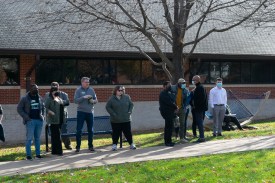John Buck, the dean of students at Webster University, said his door is open for students who want to discuss issues they may be experiencing at the university.
Following the campus walk-out on Nov. 16 and the University Center sit-in on Nov. 30, Dean of Students John Buck wants students to know that he is open to conversations about any issues they may have concerning hardships at Webster University.
Regarding the recent protests on Webster’s campus, Buck said he encourages students to continue their efforts in obtaining more information on the issues. He encourages students to reach out to him or anyone else in Student Affairs if they have questions.
“You know, I’m not going to BS you. I’m going to be very happy to explain as much as I can to let you have the full picture,” Buck said. “I’m not trying to change the hearts and minds of anybody, but I think there’s context that would matter to how ideas are being framed.”

In his 22 years at the university, Buck has seen a handful of protests on Webster’s campus. These have included marching and walk-outs for Michael Brown and small demonstrations with music. Buck said he knows these events signal meaningful issues to students.
Buck says that, as a representative of the students, it is not only his responsibility to hear student problems and help arrive at a solution, but also to be a conduit for getting information to students.
“Anybody can come in and seek me out and hang out, have a conversation, have a coffee and talk about stuff. I’ve always got to be ready and open; a modern-day dean of students has to be ready to do all those kinds of things,” Buck said.
When Webster students gathered on the quad on Nov. 16, the grievances students were demanding be addressed related to the commuter meal plan, Higher Education Emergency Relief Fund grant money, Adobe access for student devices and increases in parking tickets.
Two weeks later, some of those same students participated in a sit-in inside the University Center to protest the discontinuation of commuter meal points.
“The commuter meal plan really benefited a lot of commuters. It was only $100 per semester, which only goes so far. What’s the bigger issue there? The bigger issue is food insecurity,” Buck said.
This, Buck says, is why it is important for students to discuss their perspectives, experiences and needs with the University.
“It helps someone like me become more understanding that I go ‘a-ha, now I understand,’ through the conversation,” Buck said.
Communications director Patrick Giblin said within the past decade, the university has expanded aid opportunities and benefits with increased scholarships, two-year tuition freeze and services offered through the Academic Resource Center and other offices.
“As a private, non-profit institution, the university constantly assesses programs and services, collects sound data and makes decisions that are in the best interest of the students and the institution,” Giblin said.
Buck encourages students to continue to have conversations with university staff and officials about details and specifics involving the aforementioned grievances.
“The only way is through. The only way is to keep on dialoging and discussing and getting information,” Buck said. “And I think that makes you a better demonstrator; I think it makes you a better activist; it makes you a better rally coordinator to know more information because the more the information becomes clear, the clearer the actual issues become.”
While there is currently no plan to return commuter points, Buck said the university is working with dining partner Sodexo to make adjustments to the existing meal plan so there are options that scale down to levels of cost.
“We’ll keep the current meal plan, but have three or four other options,” Buck said. “We’re asking to kind of create a commuter meal plan, which would be smaller and have more available within it than the $100 would have.”
Details about changes in the meal plan will be revealed in January. Buck said the university will be relying on student feedback about the new ideas for commuter meal plans.
Buck said the one thing he hoped would result from the protests was for students to communicate to Student Affairs their questions or concerns about the issues surrounding the protests, to reduce the number of students who may not know all the institutional details.
“They deserve to know what’s going on and we can create opportunities to talk with them,” Buck said. “There is so much that goes on around a college campus that we kind of rely on students to say, ‘Hey, this kind of sucks. We need to fix that.’ I hope that [students] are still interested in advocating for the issues.”
Share this post
Kate McCracken (she/her) is currently a staff writer for The Journal. She has previously worked as the lifestyle editor. She is a double major in Philosophy and History, minoring in Professional Writing. She has always loved to write and create stories, and she wrote her first book at age 10. Aside from writing, Kate also enjoys photography, environmental/animal activism, paranormal investigation and oneirology, the study of dreams.




